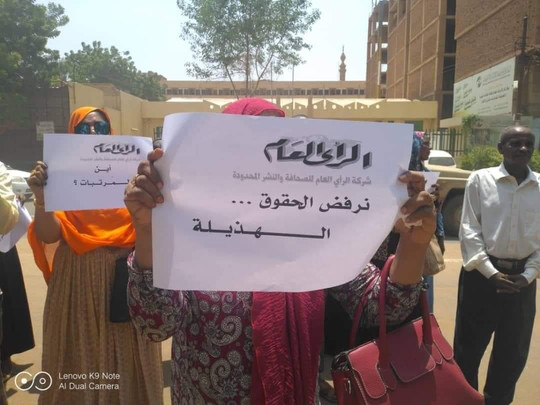The staff of the Al-Rai al-Aam newspaper, suspended by the Sudanese authorities in January 2020, are protesting against the newspaper's suspension and demanding the payment of outstanding salaries. The International Federation of Journalists (IFJ) and the Sudanese Union of Journalists (SUJ) stand in solidarity with the journalists and urge the authorities to lift the suspension and guarantee journalists' salaries.
The newspaper's workers organized a protest in front of the Council of Ministers on 16 September. They claim they have not been paid for three months and that their professional future looks uncertain since the newspaper was suspended without legal justification.
On January 7, the Sudanese Empowerment Committee announced the seizure of the daily newspapers Al-Rai al-Aam and al-Sudani and the TV channels Al-Shrooq and Tayba. Security forces occupied the offices, and all employees were forced to leave.
The Committee, which is tasked with removing the those allegedly affiliated with the former regime from positions of power, argued the suspensions were necessary to investigate the financial status of these media and claims they were established or bought using public money. In August, a government-appointed supervisor announced the dismissal of 105 journalists and media workers of the Tayba media group.
The Empowerment Committee's actions not only call in to question commitments to press freedom but it has also blatantly targeted union rights. It dissolved various trade unions, including the Sudanese Journalists Union (SJU) in December 2019.
Authorities issued an arrest warrant for SJU president Al Sadig Al Rezegy on August 16. He had refused to hand over the union's assets and properties and was charged for continuing to run the banned union.
A similar situation happened in Tunisia. Following the Tunisian revolution, the government confiscated four private media organizations which were owned by relatives of Ben Ali. All of them are still under government administration and managed by a government-appointed director. In the meantime, the government has been trying to sell them for years. In this case, the rights of the journalists working for these media have been respected since 2011, including regular salary payments and social coverage.
IFJ General Secretary Anthony Bellanger said: "We stand in solidarity with the journalists who are fighting for their fundamental rights amid an increasingly hostile environment in Sudan. The Sudanese authorities cannot ignore the media workers right to work and be paid, and must stop the crack down on journalists and unions."

